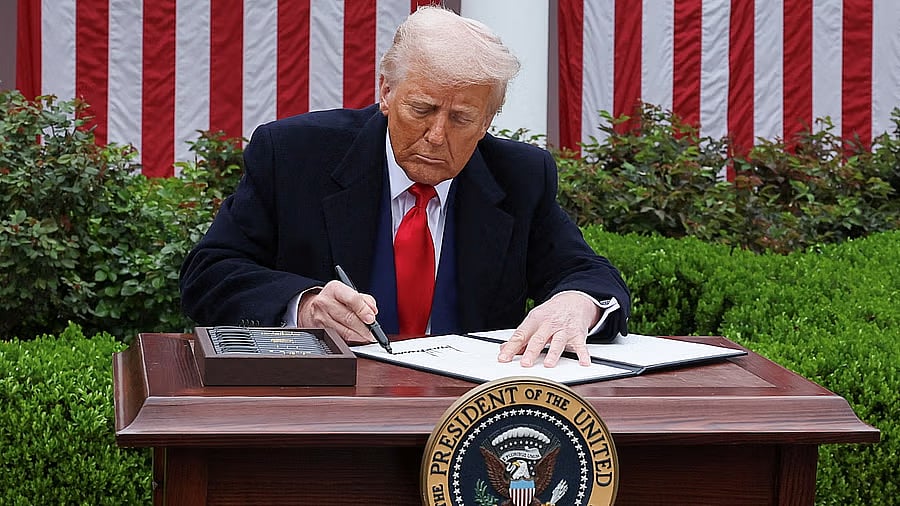
US President Donald Trump
Credit: Reuters Photo
Call it a case of the strong doing what they can or a reaffirmation of the long-held notion that countries only have permanent interests. On both counts, you are right.
The ‘Liberation Day’ tariff announcements made by United States President Donald Trump covering all countries — including those considered friendly to the US — clearly demonstrated that the world’s most powerful nation can do, at any time of its choosing, what it feels is necessary to advance its agenda. It is being left to the rest of the world to pick up the pieces and figure out how they will deal with Trump’s tariff announcements.
A 10 per cent reciprocal tariff, for instance, was imposed on imports from the United Kingdom, 20 per cent on that from the European Union, 24 per cent on Japan, 26 per cent on India, and 34 per cent on China because of what Trump termed was due to him being kind to these countries on the reciprocal tariffs front. Among other South Asian countries, a 37 per cent reciprocal tax was imposed on Bangladesh, 29 per cent on Pakistan, and 44 per cent on Sri Lanka. Even Nepal got hit by a baseline tariff of 10 per cent, buttressing the point that as far as Trump is concerned, any country which he felt had been gaining at the expense of the US would have to pay for that from here on.
Trump knew all along that the tariffs would have the potential to get more countries to rush to sign bilateral trade deals with the US to protect their economic interests and also, be in the US’ good books. Moreover, Trump was aware that these announcements could send out a strong message to his supporters that he was a tough leader who could both talk the talk and walk the walk.
The April 2 tariffs may serve both these purposes, with only the extent of the gains made on the bilateral deals front possibly to be known in time to come.
To have expected that Trump would do anything different from what he is doing may have been wishful thinking. He was not going to miss out on an opportunity to pile on added pressure to extract more concessions from key nations when he had seen how even the tariff-related statements which came prior to April 2 got many countries to lower the duties they charged on several US goods. India, for example, had announced duty cuts on several US goods, including bourbon whiskey, even before ‘Liberation Day’.
Trump has only been doing what he said he would do. If other countries did not realise the level of the seriousness which he accorded to tariffs, that is surely not his problem.
It would be simplistic to assume that Trump would not have worked out the possible impact that some of his tariff announcements could have on the American people in terms of them likely having to pay more for some of the imported goods. He would have also factored in the ramifications of retaliatory tariffs being imposed by certain countries.
Trump’s ability to rightly gauge the public mood is what made him the US president for a second time. Thus, even if a strategy is not revealed now on how to keep price rise in the US in check, it would be done soon, most possibly accompanied by the Trump administration highlighting the gains that have accrued for the US from the tough stance taken on the tariffs front. An action plan on how the US would deal with the retaliatory tariffs issue could also be expected to be stated shortly.
From an India perspective, the expectation would be that local businesses would step up and make greater efforts to become competitive in the wake of the fresh challenge posed by the tariffs. In this connection, though, it would also be good if India could put its best foot forward to conclude a fair and balanced bilateral trade deal with the US, and, moreover, show that it would have the back of its micro, small and medium enterprises (MSMEs) during this trying period.
For India’s MSMEs, getting that feeling of conviction that they would not be left to fend for themselves can motivate them to try that much harder to become more resilient and efficient. Every country does its best to take care of home-grown companies. There is no reason which should make India hesitate in being seen to be doing likewise, while taking care to ensure that the steps taken in this connection are not deemed to be coming in the way of promoting free and fair competition.
Some of the possible ways through which India’s MSMEs could be helped at this critical juncture are:
· A strong vigil maintained on possible instances of dumping of goods into India, fast-track investigations being conducted on dumping-related complaints, and India not being shy in imposing anti-dumping duties.
· Visible hand-holding provided to MSME units to improve the quality of their products so that they can find newer markets to sell at more attractive prices.
· Large Indian enterprises being goaded to help their vendors (typically small and medium-sized companies) in making the shift to clean energy.
· MSMEs being provided additional incentives to invest in R&D for coming up with innovative offerings.
· Trade offices being set up in newer destinations worldwide to market the advantages of trading with India.
(Sumali Moitra is a current affairs commentator. X: @sumalimoitra. Views expressed are personal.)
Disclaimer: The views expressed above are the author's own. They do not necessarily reflect the views of DH.